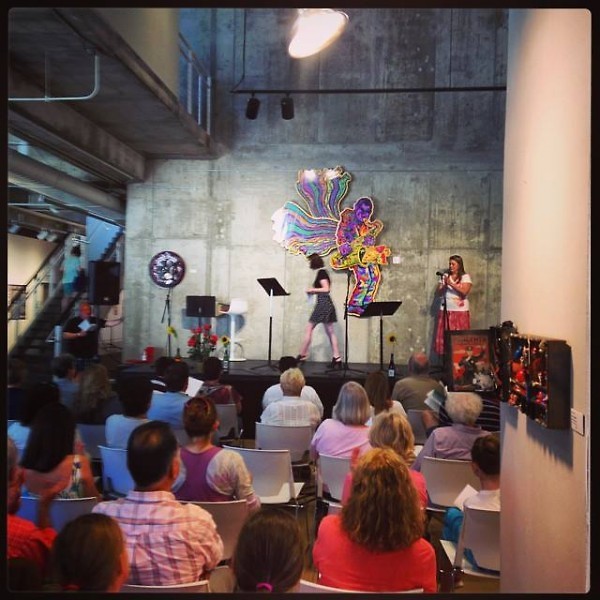Over the last several years, Grand Rapids has been the scene of a burgeoning, multifaceted poetry movement. Visitors to open mic nights such as Eastown Hookah Lounge’s Smokin’ Spoken Word and Stella Lounge’s The Drunken Retort will be familiar with the format, and Mayan Buzz Cafe now offers an all-ages option on Thursday evenings called All Access Open Mic, which finally gives high school poets an avenue for expression as well. Performers take to the mic, often with memorized verse, and collaborate - or sometimes compete - to elicit audience appreciation.
Poets less inclined toward performance can take advantage of the Great Lakes Commonwealth of Letters, a writers' collective and reading room located on the corner of Wealthy and Eastern. An annual membership will permit local writers to use the space to host readings, hold workshops, and, when the space is unbooked, escape the fray of daily life to pen a quiet line or two. Periodic events, like the new “Writers Under Thirty” series, are also open to the public. Other events are geared toward assisting poets with the constantly evolving, sometimes nerve-wracking adventure of submitting poetry for nationwide publication.
But many young local writers are unaware that there is also an avenue toward not only recognition but also publication right here in Kent County. Launched forty-nine years ago, the Dyer-Ives Poetry Competition offers the opportunity for Kent County residents of all ages to submit their poetry for publication in its annual journal, Voices, and moreover, provides cash prizes to winning poets. The competition is all-ages, and is divided into three categories; elementary, student, and adult.
Originally hosted by the Dyer-Ives Foundation, which was put together to facilitate the contest at its inception, the competition will be a program of the Grand Rapids Public Library going forward. The Foundation closed its doors in 2016, its members eager to pass the baton after many years of promoting poetry in the area, and Competition Director Christine Krieger was eager to see it taken up by the right entity.
“It became clearer and clearer to me that the Grand Rapids Public Library was just the right fit,” said Krieger of the transition. This is her thirteenth year at the helm of the competition, so her insight and experience has helped ease the process.
Each year, the competition welcomes a nationally acclaimed poet to act as judge. The 2017 National Judge will be poet Oliver de la Paz, author of three collections of poetry and professor at College of the Holy Cross. Inspired as an only child by his parents’ subscription to Readers’ Digest, and by spare time spent fiddling with their typewriter, de la Paz eventually sought out and received encouragement from his first poetry teacher at Loyola Marymount University. He went on to pursue graduate studies at Arizona State University, where three mentors helped to hone his focus and refine his skills. “All of them [were] very different poets, and all of them outstanding mentors,” he said of the trio. A large part of the Dyer-Ives mission is to encourage young local poets to write freely and seek mentorship that helps develop their craft.
As a first generation Filipino-American, de la Paz recognized poetry’s ability to tell stories of movement and place through fellow Asian American poet Li-Young Lee. “Immediately I understood his family’s story of exile and longing,” he recalls of his first reading of Lee’s book Rose. De la Paz carried this understanding into his first collection of poems, in the rare form of a poetic novella, Names Above Houses (SIU Press, 2001). It follows a young boy through his family’s journey from the Philippines to San Francisco and through his own instinctive dance of unmooring and resettling, not uniquely biographical, yet not dissimilar to de la Paz’s own coming of age.
“It’s really a composite portrait of several narratives,” de la Paz reflects. Poetry can be a powerful vehicle for communicating identity across barriers of space, culture, and nationality. “Immigrants such as myself have had to make metaphors constantly to articulate our self-hoods in the face of a society who may not understand,” he explains, acknowledging how differences in experience can create a gulf that simple language sometimes struggles to bridge. “It’s just the vehicles are idiosyncratic, and if we’re doing our job as poets those idiosyncratic moments are resonant moments.”
De la Paz’s writing, both in Names Above Houses and in subsequent collections Furious Lullaby (SUI Press, 2007) and Requiem for the Orchard (U. of Akron Press, 2010), somehow manages to be both spritely and deliberate; grounded in tradition, yet refreshingly facile and unencumbered. There is a cyclical interplay of the visual and the tactile, and a sense of inevitably regenerating queries. Thematically, his work spans from the minutiae of familial tensions and meticulously remembered childhood moments to the vast unknowability of the universe and our place within it.
In “Autumn Scene As Lullaby,” from Requiem for the Orchard, de la Paz opines, “Despite all the pathos love’s door invites, the purpose / of nights like these is to ask the questions / and fail to understand.” It is a statement that caries within it the very mechanism of the craft, that encourages the questioner, the poet, to ask, and if no response is forthcoming, ask again. It speaks to why we write, and why the act of writing demands that we continue, whether or not we succeed, to pursue understanding through perpetual poetic expression. It is this quest which, in all its many forms, the Dyer-Ives Poetry Competition seeks to uphold and reward.
Submissions for the competition are open starting February 1 and close at midnight on March 1st. More information about how to submit can be found at grpl.org/dyer-ives. You can follow Dyer-Ives on Facebook, Instagram, and Twitter for inspiration and reminders about the competition. Kent County residents of all ages, whether seasoned poets or first-time scribblers, are encouraged to submit.
Correction: an earlier verson of this article mistakenly stated that de la Paz still teaches at Western Washington University. We apologize for the mistake, and it has been corrected.
The Rapidian, a program of the 501(c)3 nonprofit Community Media Center, relies on the community’s support to help cover the cost of training reporters and publishing content.
We need your help.
If each of our readers and content creators who values this community platform help support its creation and maintenance, The Rapidian can continue to educate and facilitate a conversation around issues for years to come.
Please support The Rapidian and make a contribution today.


